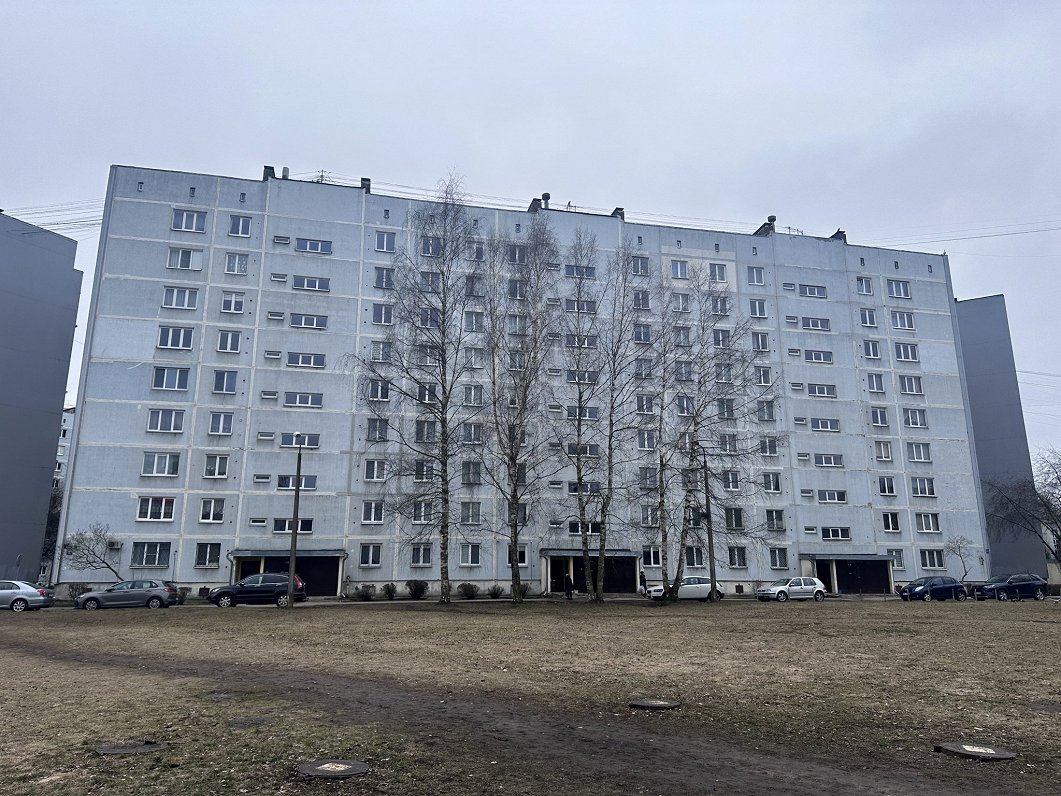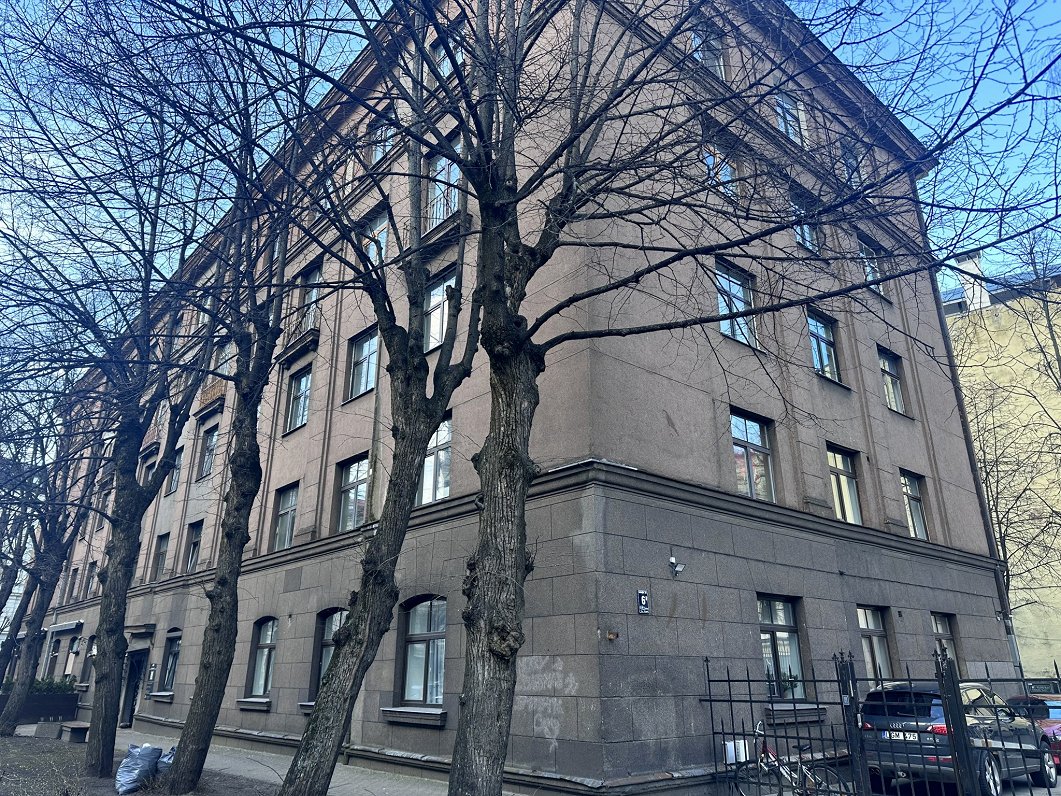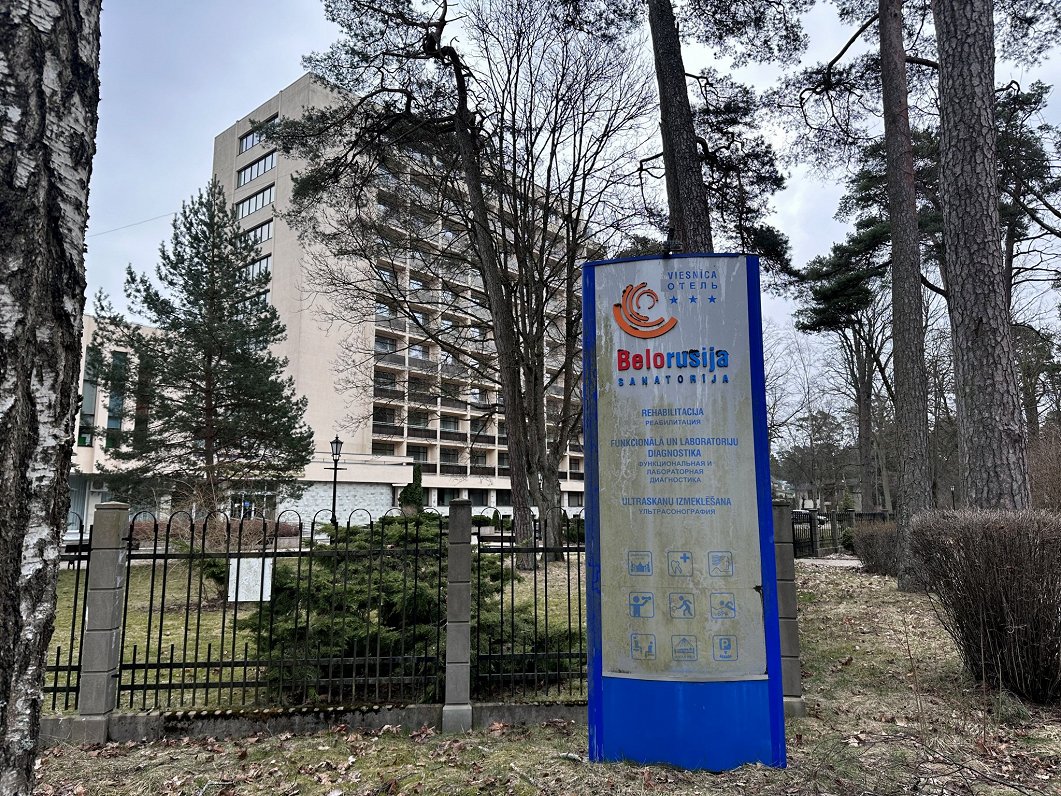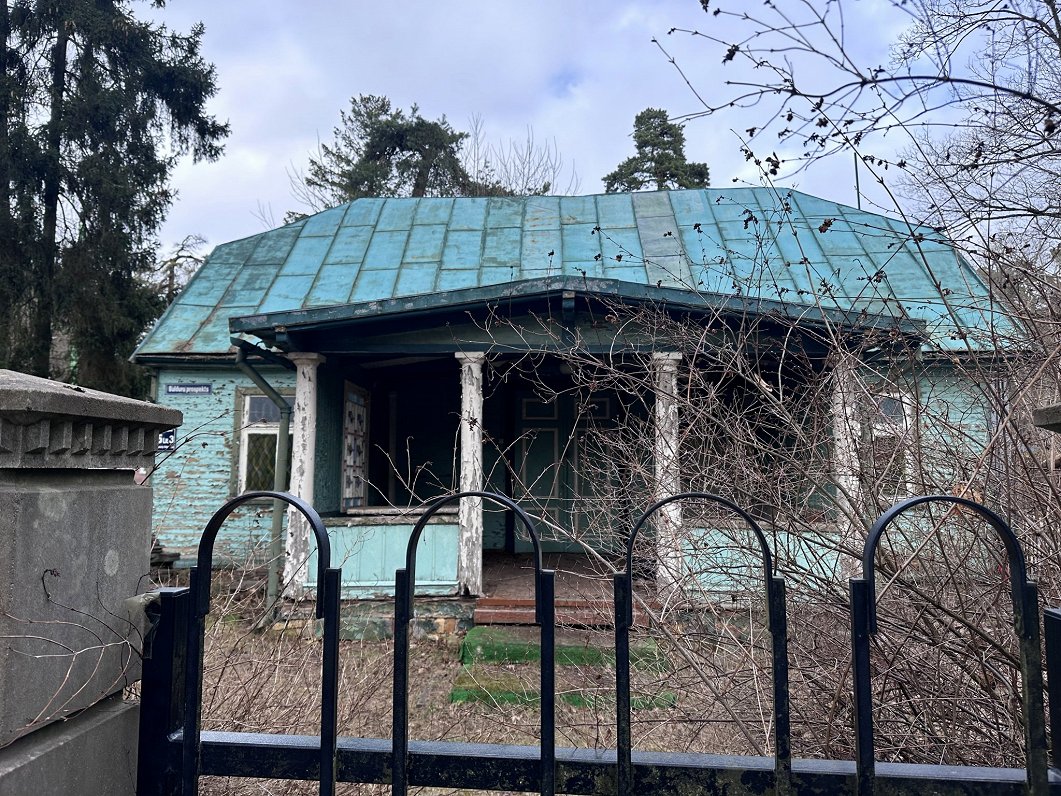Moscow House
In the center of Riga, the large "Moscow House" (Maskavas Nams) building belonged to Russia for many years. In 2001, the company "Latvijas dzelzceļš" handed over the building worth 355,000 euros to the property department of the city of Moscow. The building was renovated with its money and opened as "Moscow House", in principle as a business and culture center. But for many years, even after Russia's full-scale invasion of Ukraine, it became an instrument of the Kremlin to carry on its information war in Latvia.
Now the building, which was one of the most famous Russian properties in Latvia, stands empty. In January of this year, the Saeima adopted a law on the transfer of Moscow House into the ownership of the Latvian state as a matter of urgency.
Apartments in Rīga
In its investigation, Open Files found out that Russia owns 16 other properties in Latvia, while Belarus has 15.
One of them is located on Slokas Street in Rīga's Imanta suburb. In a nine-story residential building, one of the apartments located on the third floor belongs to the Russian Embassy. At the front door, no one answered the intercom call, and no one opened the door either. The neighbors did not know who lived in this apartment, while the readings of the electricity meters, which can be seen right there in the stairwell, suggest that no one lives in the apartment permanently. When Latvia Radio'' reporter returned a week later, the readings still hadn't changed, and the letterbox was stuffed full of promotional flyers.

The apartment is the only one in the entire stairwell that does not have a number on the door. The dark wooden front door with a glass window in the middle stands out against the background of the rest of the apartments, as it seems to have been replaced in recent years.
Why does the Russian embassy own an apartment in this unassuming Imanta block?
An entry in the Land Registry shows that the approximately 50 square meter apartment was donated to the Russian Embassy in the fall of 1997. However, information about the donor cannot be found in the land register. The judicial administration, which maintains the computerized land register, did not answer an enquiry about why the record of the donor of the apartment was deleted.
Another apartment belonging to the Russian Embassy is located in the quiet center of Riga at Antonijas Street 6A, not far from the Russian embassy. The embassy inherited it in 2005 from a man named Sergey Kostromin. The only information known about him is that he was born in Altai, Russia.

There are also other Russian properties in the neighborhood, such as a house on Andreja Pumpura Street, two historical houses at 3 and 5 Alberta Street, as well as the Russian Embassy building itself at (recently-renamed) 2 Ukrainian Independence Street.
Six Russian and two Belarusian properties
Ināra Papina, head of Riga City Council's revenue department and deputy director of the Finance Department, says there are several more properties in the Latvian capital owned by the aggressor states: "There are six owned by Russia, as far as we have identified, and two owned by the Belarusian state."
She says that all properties in Riga are used for diplomatic and consular missions. This means that taxes can be avoided, according to the information that the Ministry of Foreign Affairs has provided to the Riga City Council.
"According to the law "On real estate tax", these properties are exempted from tax on the condition that Latvia enjoys its own rights and privileges in the opposite country, which is the legislation of the respective country," explains Papina.
Bolt-holes in Liepāja, Daugavpils and Jūrmala
Russia also owns other properties in Latvia. Liepāja and Daugavpils each have two apartments. In Daugavpils, there is also a former consulate general building and garages next to an apartment building.
The Office of the President of Russia owns the large Jūrmala sanatorium named "Jantarnij bereg" or "Dzintarkrasts" (Amber coast), plus a mineral water pump house, and other utility buildings, right on the Baltic coast. It closed its doors in 2022 after the imposition of sanctions following the attack on Ukraine.
Just ten kilometers away is the "Belorusija" sanatorium controlled by the President of Belarus, Alexander Lukashenko.

Soon after the full-scale invasion of Ukraine, the State Security Service reported that the managers of the two sanatoriums - Russian citizen Viktor Daniloh and Belarusian citizen Alexander Gruzdov – were included on Latvia's entry "blacklist". This means they cannot enter the country.
According to the security service, both worked in the interests of Russia, and Putin's sanatorium served as a support point for Russian influence measures.
Sanctioned sanatoria
The "Belorusija" is an 11-story building, located close to the seashore in Bulduri, Jurmala. The building belongs to the Office of the President of the Republic of Belarus and is under the direct control of dictator Alexander Lukashenko.
At the moment, the sanatorium is closed to visitors and not even a security guard can be seen on its territory. There are several other smaller buildings directly across the street from the main sanatorium which are also controlled by Lukashenko. The estimated value of the property in the foundation's statutes is six million euros.
Two more blue wooden houses can be seen in the area, on the number plates of which it is written that it is the property of "Belarus". One of the buildings seems to be in good condition, but the other is very dilapidated.

Not all the buildings here are similarly marked, however, certain things point to a connection with the institution controlled by Lukashenko. For example, an old bus with the name of a sanatorium is parked behind a farm building in the same area.
Comparing the building numbers with the information in the "Lursoft" business database, it can be concluded that other buildings in the fenced area served as luxury lodgings for visitors to the sanatorium until recently.
When asked how the sanatorium and the other historical buildings in Jūrmala came to be owned by the President of Belarus, the representative of the Ministry of Foreign Affairs, Dace Eglīte, stated in a written answer:
"The sanatorium "Belorusija" was handed over to the Belarusian side in accordance with the 1993 agreement between the Government of the Republic of Latvia and the Government of the Republic of Belarus [..], which confirms the agreement of the parties that the buildings and structures of the sanatorium were built at the expense of Belarus in accordance with the procedures specified in the legislative acts, [and that] vehicles, medical and other equipment, which are on the balance sheet of the sanatorium, are also the property of Belarus."
Million-euro payout
In 2020, Alexander Lukashenko was declared the winner of a rigged Belarusian presidential election. Politicians from many countries around the world condemned the election, including Latvian officials at the time: President Egils Levits, Prime Minister Krišjānis Kariņš and Foreign Minister Edgars Rinkēvičs.
However, several months after the elections, in January 2021, the Lukashenko-controlled sanatorium in Jūrmala began to receive generous support from the Latvian state budget to overcome the consequences of the Covid-19 pandemic.
Latvian Radio reveals that from January 20, 2021 to January 17, 2022, the "Belorusija" sanitorium received more than a million euros from Latvian taxpayers: 1,079,187.41 euros, to be precise.
Financial support was provided by the Investment and Development Agency of Latvia, as well as the State Revenue Service. The State Revenue Service (VID) transferred idle benefits, wage subsidies and working capital in several payments.
"Initially, it was expected that this support [..] might not be widespread and numerically large, but [..] the crisis lasted, and we all certainly remember that there were also periods when the operations of companies were partially or completely suspended," explained Inese Spirka, representative of the Tax Payment Promotion Board of VID.
Astonishingly, at the time when the SRS made the payments, the institution apparently did not know that the sanatorium was controlled by Lukashenko.
"We really found ourselves in a crisis situation... we simply fulfilled the duties assigned to us in good faith, and we really examined each and every submission in accordance with the regulations of the Cabinet of Ministers and the information available to us," stated Spirka.
Lukashenko's sanatorium by the sea also received money from the Investment and Development Agency of Latvia (LIAA). It administered a support program during the pandemic to help businesses in the tourism sector overcome the effects of Covid-19.
"Belorusija" received support twice. "The first time, respectively, to compensate for these downtime expenses, that is, for employee benefits. And the second time... also to cover some kind of operational expenses that had arisen for the maintenance of the hotel during this time," explained the acting director of LIAA Iveta Strupkaja.
As with the VID, it seems in this support program the sanatorium met the conditions to receive generous handouts.
When asked whether LIAA evaluated the owners of the sanatorium before disbursing the money, Strupkaja answered: "We also looked at the real beneficiaries and also at the chain of owners. Moreover, we also consulted with the Ministry of Foreign Affairs to get an explanation about whether and how in this case, the sanctions imposed by the United States and the European Union should be looked at and applied."
But did the agency know that the recipient of the money was under the direct control of Lukashenko?
"We didn't know it at that moment, and the Ministry of Foreign Affairs didn't know it either," admits the LIAA representative and points out that none of the board members of the sanatorium was included in the sanctions lists at that time.
"Also the real estate itself, where this legal entity operates, belonged to a subject that was not subject to sanctions at that time, accordingly we did not have any legislative norms that would prevent us from paying the specific sums of money to the hotel "Belorusija", explains Strupkaja.
In order to receive support, the sanatorium submitted an application for the first time even before the presidential elections of Belarus in 2020.
"Of course, we also consulted with the Ministry of Foreign Affairs about whether we are not violating any sanctions. At that moment, that decision was in accordance with the situation and in accordance with the legislation," emphasizes the representative of LIAA.
The fact that Belarus finances the activities of the sanatorium is written in its statutes. On the other hand, the annual reports indicate many times that the main visitors of the sanatorium are residents of Russia, Belarus and Latvia. The financial indicators of "Belarosija" are far from successful. Since 2017, it has been working with annual losses of several hundreds of thousands of euros.
Property rights and effective sanctions
The parliamentary secretary of the Ministry of Justice, Lauma Paegļkalna, warns that assets belonging to the Russian and Belarusian states, and to individual persons included in sanctions lists, cannot be lumped together. They should be evaluated differently.
"First of all, because these are objects of sanctions and there is a specific regulation of sanctions. And [...] operations with these properties must, of course, be coordinated throughout the European legal space," explains Paegļkalna, adding that having an effective sanctions regime must be balanced with a predictable and reliable set of property rights.
Nevertheless, the decision of politicians to take "Moscow House" into state ownership is a unique and unprecedented case. "I think we should realize that this is an extremely important milestone. The Ukrainians are really very grateful to us for this," adds Paegļkalna.
However, the same cannot be done with the rest of the properties belonging to Russia and Belarus, because according to the information available to the Ministry of Justice, similar activities against national security were not taking place there.
"Consequently, these properties must be looked at differently than the property in which the so-called 'Moscow House' was located. There, as a country, we directly addressed a threat to statehood, limiting the spread of so-called "compatriot politics" and, in fact, disinformation and propaganda," emphasizes Paegļkalna.
Beāte Livdanska, a researcher at the Latvian Institute of International Affairs (LIIA), agrees that when it comes to the assets of Russia and Belarus worth millions of euros in Latvia, the main thing is to look at what purpose they serve:
"The big question is whether these are ordinary properties, for example, with commercial purposes, or whether they are part of Russia's expanded information war, for example, against Latvia."
Livdanska recalls that the "Moscow House" was just such a property - it functioned as an essential element in the information war.
When asked whether the humble apartment in Imanta's nine-story block house is worth increased attention, Livdanska says that it should be primarily evaluated by our national security services.
"The overriding question is how transparent is the existence of ownership rights? If it is not possible, let's say, to connect up where this property came from and for what purpose it is used, [then], of course, all this must be evaluated," says the researcher.
This rightly raises suspicions as to why such apartments are part of the embassy's property portfolio. "Of course, let's not be naive, and what these apartments are used for is definitely not to house a diplomat or his family, maybe even if that was the case, the purpose is certainly greater than that," said Livdanska.


























